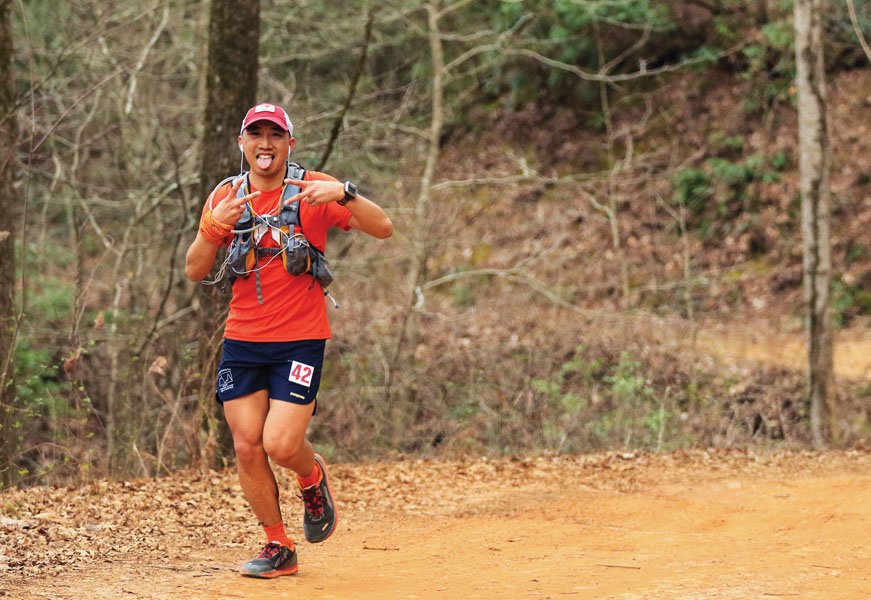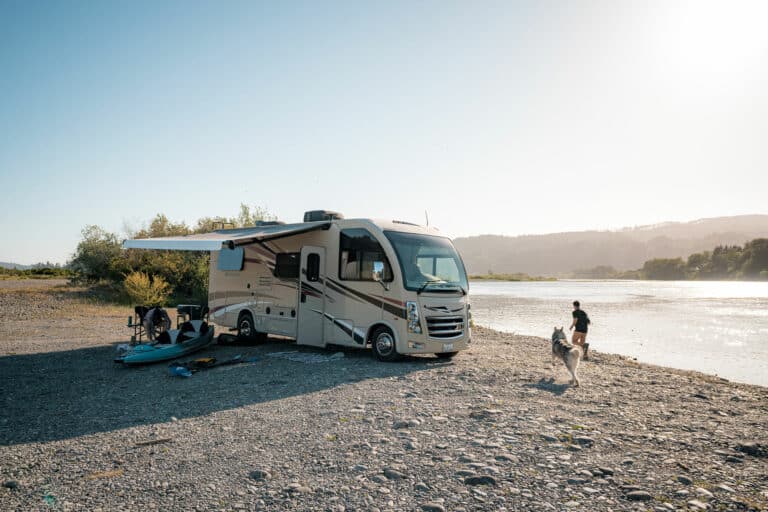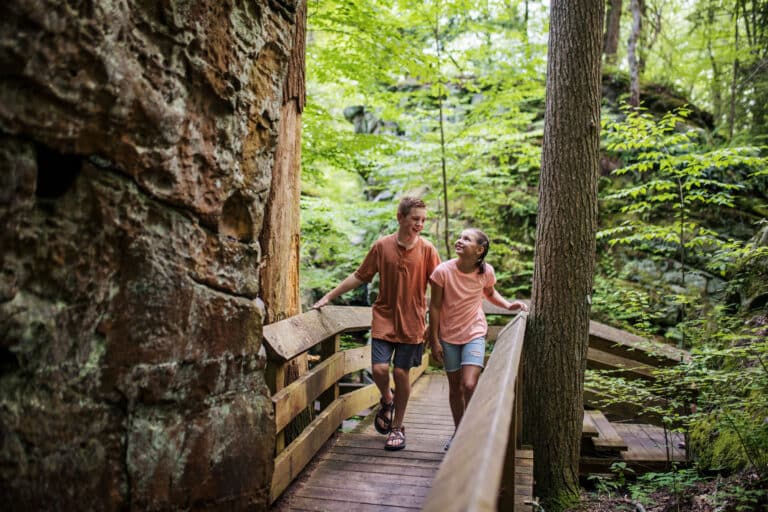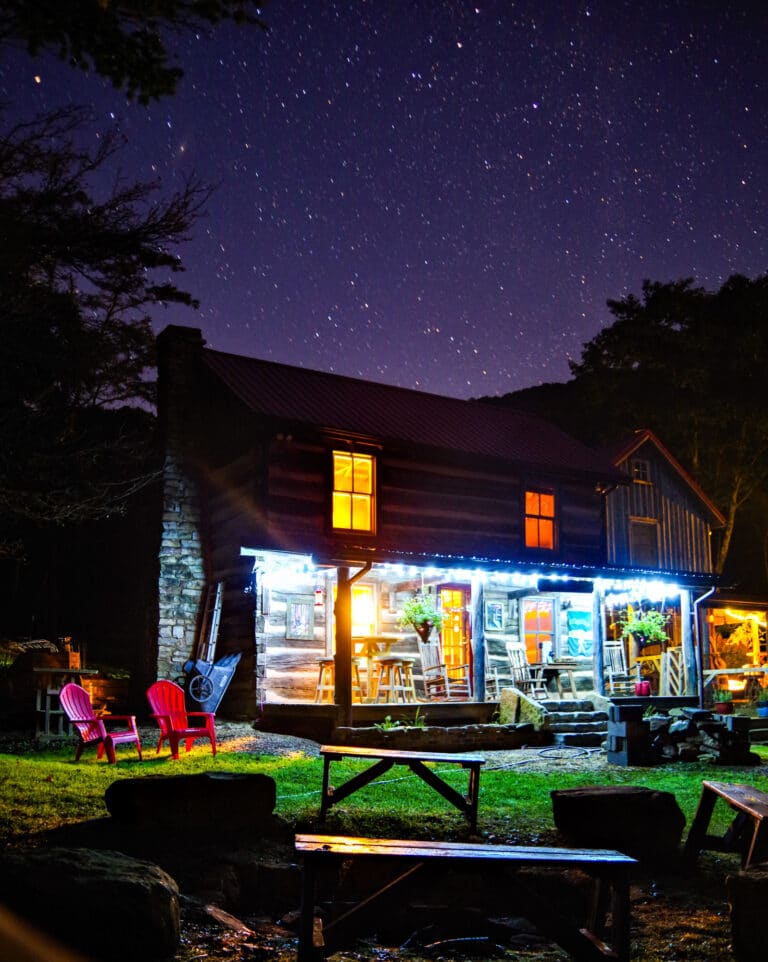We asked four regional long-distance trail runners from different walks of life to finish the sentence “Running is…” Their answer, and more, in this month’s trail running spotlight.
MY HAPPY PLACE
Jordan Chang
Base: Blacksburg, Va.
Age: 29
If you’ve ever found yourself hiking on the Appalachian Trail near Catawba, Va., during a weekend, chances are you’ve passed by Jordan Chang. Or, more likely, he’s passed by you. A Virginia Tech graduate and now Blacksburg-based physical therapist, the Baltimore native regularly takes the podium at a number of the region’s top races—last year, he won the Grayson Highlands 50K and in 2015, during his ninth running of Hellgate 100K, he finished third.
For Chang, these longer distance ultras are just a continuation of a passion that was planted long before he arrived in the mountains of Southwest Virginia, and long before he knew what an ultra was. In high school, Chang ran cross-country and track all four years.
“I was pretty terrible,” he says. “I was like a 16-minute, 5K guy. Nothing stellar. I am not a naturally talented runner, but that’s the thing about running. If you put in the work, you’ll reap the benefits.”
So he put in the work. He kept running, despite being unable to make Tech’s cross-country and track teams. Instead, he turned his attention to the triathlon team and Tech’s then-budding ultra marathon scene. A long-distance rookie at best, Chang was undeterred by the mileage. If not the fastest runner, he was certainly the strongest of his fellow triathlon teammates. So in 2006, during the second semester of his freshman year, he ran his first ultra, the Holiday Lake 50K.
“I had no idea what was going on,” he says. “I was wearing racing flats and had a hand bottle. I went out fast like it was a marathon,” and when Jenn Shelton, the top contender in the women’s field, caught Chang just 10 miles into the race, he went faster. “I was just a teenager,” he remembers. “I was like, ‘I’m not going to be beat by a girl.’”
Chang kept the pace for well over 15 miles. It was a typical February day—cold, sometimes raining, sometimes snowing. Despite the race’s relatively flat course, Chang couldn’t keep stride. Jenn passed him. He placed ninth in the men’s division, tail between his legs, ego limping behind.
“I crawled my way back to the finish line,” he says. “That was my first ultra, and I said, ‘I’m never doing another one.’”
Of course, once Chang swallowed his pride, he had a change of heart. His performance at Holiday Lake made him want to run more, train more, see more. Since then, he’s run the Grand Canyon Rim to Rim to Rim in under 13 hours and placed tenth in the grueling Bear 100 in Utah. He’s a two-time Iron Mountain 50 Mile champion. He now works as the team doc for Tech’s ultrarunning club and wants these young runners to see, at heart, what running is all about.
“Running really taught me a lot of patience, especially ultrarunning. It’s not something that’s going to happen overnight, or even in a year. It’s something you build towards for months and years, but even then, the success is finding joy in what you do. That’s why we do this. We do it for the love of it.”
HARD WORK
Daniel Hamilton
Base: LaFayette, Ga.
Age: 28
For the first 11 years of his life, Daniel Hamilton’s playground didn’t have swings or slides. There was no mulched area fenced in by watchful parents and seesaws. No, Daniel Hamilton had to do without the traditional sense of the word “playground.” But that’s okay. He had elephants and giraffes, lions and monkeys, and Africa’s highest summit, Mount Kilimanjaro, out his backdoor. For a child growing up in eastern Africa, the outdoors was all he had.
Which might have been his saving grace when his family uprooted their lives and moved to the quaint town of Franklin in western North Carolina.
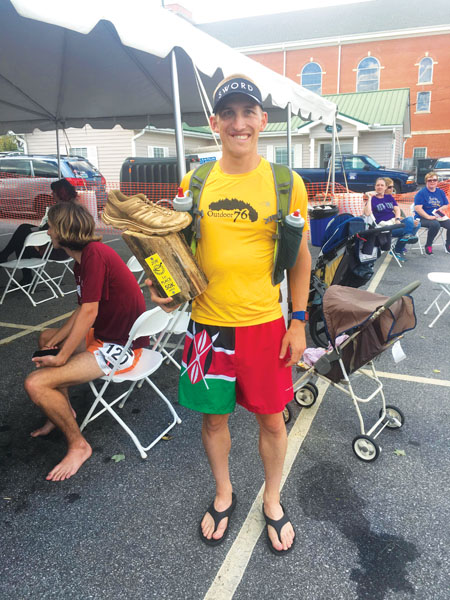
“I was in trouble a lot at school,” Hamilton remembers. “I had played soccer a lot in Africa, so when I first got [to Franklin], I started running. Once I started running, I stopped getting in trouble.”
And, once Hamilton stopped getting in trouble, he started to do better in school, in running, in life. Suddenly, the prospect of college was on the table, a possibility he’d never considered.
“Running put pressure on me to rise to another level,” he says. “I couldn’t always go out with my friends and do what I wanted to do, so I had to learn discipline really quickly. I started to do everything with purpose and it offered focus at a time when I really needed it.”
Hamilton went on to run the 1500 at King University in Bristol, where he received his degree in psychology. When he graduated, he didn’t feel the supreme sense of freedom he was expecting. If anything, he felt fear.
“That transition out of college into the real world when you’ve been a collegiate athlete, it’s really hard,” he says. “A lot of mistakes post-collegiate athletes make are because they don’t keep running in their lives. They polarize against it. It wasn’t easy to keep running, because you don’t have the support system purely for running anymore. It’s like your four years are up, good luck.”
Recognizing not just the physical but also the psychological benefits running afforded him, Hamilton kept running and started signing up for races as a motivator. In 2014, he registered for his first-ever 50K, the StumpJump 50K in Chattanooga. Surprising even himself, he won it.
The next year, Hamilton racked up even more trail time and more podiums—second overall at the Mountain Mist 50K in Huntsville, Ala.; first overall in the Mount Mitchell Challenge 40-miler; first at The Naturalist 50K where it all started in Franklin; and first again at the Lookout Mountain 50 Miler.
Hamilton’s now coping with some pretty big changes—in 2016, he married, became a father, and started a new job as a high school guidance counselor and high school cross-country and track coach. His relationship to running, it seems, has come full circle. From wayward student to collegiate athlete, racer, and now coach. If there’s one thing he wants his students to take away, it’s that running can be whatever you need or want it to be, if you’re willing to put in the work.
“I’m always wrestling with these feelings of inadequacy and need to achieve,” Hamilton says. “If you call those, say, my demons, running puts me right up against those. That’s why running is my best friend and my worst enemy. You get up every day and you work as hard as you can and sometimes things don’t work out, but that’s no reason to not go after something every single day like it’s your last day on Earth. Because sometimes things will work out and that is worth all those times things don’t.”
HOPE
Phil Phelan
Base: Jacksonville, Fla., Linville Falls, N.C.
Age: 36
Phil Phelan will be the first to tell you that there was a point in his life when he had no faith. An alcoholic struggling to cope with his parents’ divorce, Phelan was floating in life, in work. The idea that his existence could serve some purpose was hardly a thought.
“When you have a dependency of that magnitude, you let everybody down around you,” he says. “You can say that you don’t, you can lie, but really and truthfully, you can’t lie to yourself.”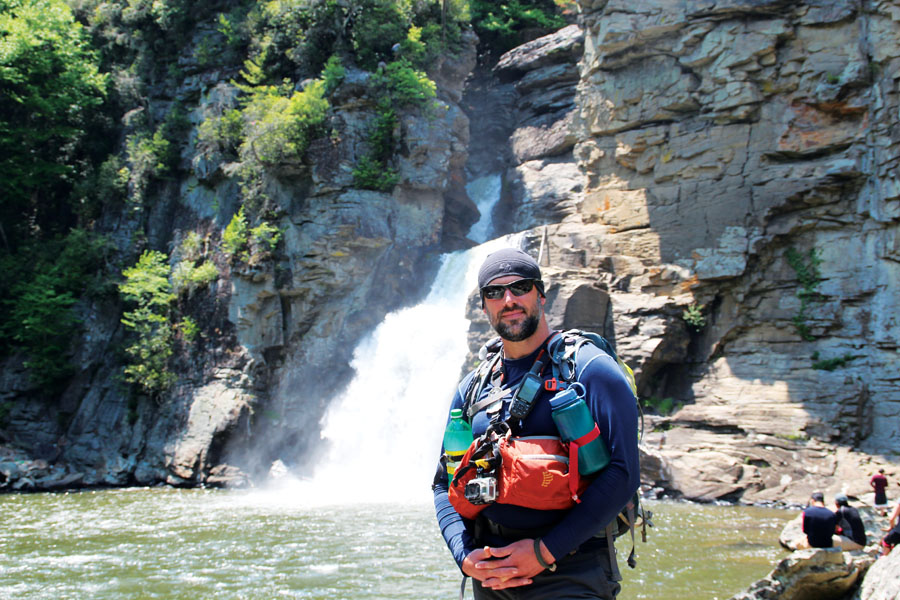 All of that changed in the year 1999. While the rest of the world was absorbed in the possibilities of mayhem and destruction at the hands of Y2K, Phelan was overwhelmed with peace and purpose in what became his terrestrial heaven, the Linville Gorge.
All of that changed in the year 1999. While the rest of the world was absorbed in the possibilities of mayhem and destruction at the hands of Y2K, Phelan was overwhelmed with peace and purpose in what became his terrestrial heaven, the Linville Gorge.
“When I found Linville, that’s really when I started hiking,” Phelan remembers. “What drew me to Linville was the amount of virgin rock. It became apparent that that was some serious terrain.”
And that serious terrain presented a serious challenge. Though he’d primarily been a rock climber in the past, Phelan hung up his rack and strapped on a pair of boots. He was mesmerized by the Linville’s rugged trails, some of which had never been documented before. He started drawing maps and taking notes of his explorations in the Gorge, never thinking of it as anything more than a personal aide.
Then, in 2002, an idea started to take form. What if Phelan could hike all of the Linville Wilderness in one concerted effort? It was something no one had ever done before, and he wasn’t entirely sure he could do it, or if he could, how long it would take. But in 2007, Phelan set out and completed the now infamous Linville Gorge Hiking Circuit, a 33.93-mile journey packed with over 16,000 feet of elevation, in just 23 hours and 10 minutes.
“I’m a firm believer that your mind will allow you to take you above and beyond,” Phelan says. “With speed records, it really comes down to: are you happy with where you’re at, or do you think you can do better? Is there something more than you think you have in the tank?”
Phelan knew he had more. In 2013, he established another circuit, this time combining 161.2 miles of trails and over 62,000 feet of elevation between Grandfather Mountain, Linville Gorge, and Mount Mitchell. This circuit he completed in just four days, 23 hours, and 18 minutes. Two years later, Phelan set the self-supported speed record for the Blue Ridge Parkway and Skyline Drive at 17 days and 16 minutes. Last year, Phelan attempted to establish a fastest known time (FKT) during his yo-yo thru-hike of the Florida National Scenic Trail, but was unsuccessful.
Now five years sober, Phelan looks at these long-distance trails much like his path to sobriety—inevitably hard, full of failure, but necessary. Once one feat is accomplished, he says, there’s always another mountain to move.
“I don’t run from, I run for,” he says. “When I’m out there, it’s hard, absolutely. Have I cried? Absolutely. You are going to get knocked down. You know you’re going to fail. But you’ve got to go to the arena to fail. Sometimes things don’t work out the way you want. Does that make you a failure? No, it does not. Sometimes things succeed. Does that make you a winner? No, it does not.”
Winning, in Phelan’s eyes, is more a measure of happiness and less about securing another FKT. Winning is believing in yourself, no matter how small the accomplishments you make, no matter how slow the progress.
“As long as you can get out there and do something, if you can put one step forward, and maybe today you can only run a flat quarter-mile, if you just get up and start, that’s all it takes.”
MY CHANCE TO BE FREE
Morgan Elliott
Base: Aspen, Colo., Asheville, N.C.
Age: 24
You’ve probably never heard of Morgan Elliott. He likes it that way. Strong, slim, with a mess of unruly hair, Elliott exudes enthusiasm for life. Just a few years out of college, Elliott is relatively new to the world of ultrarunning. He ran cross-country and track all throughout high school and during his time at Slippery Rock University in Pennsylvania. But it wasn’t until May 2015 at the Quest for the Crest Race in western North Carolina that Elliott debuted at his first ultra. Surprising everyone, he won with a time of 5:59.
“I chose that race because I felt like if I could do it, everything after that should feel easy,” Elliott says of the Quest for the Crest, a course that packs in over 11,000 feet of elevation gain in its 33 miles. “It was kinda all or nothing for me when it came to picking my first ultra.”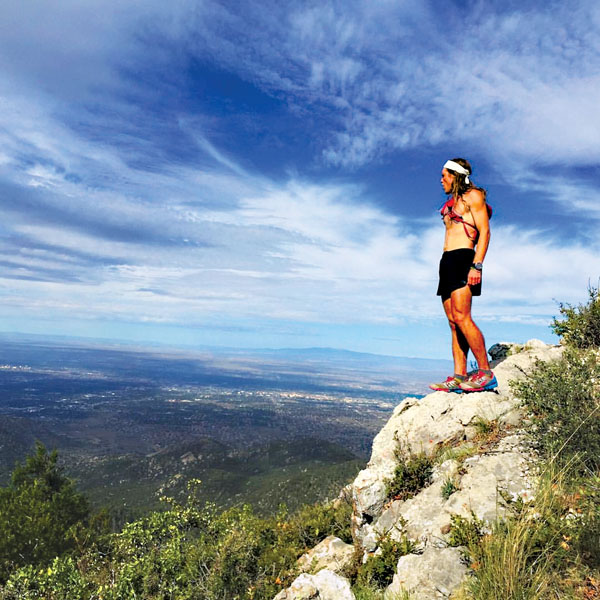
That all-or-nothing attitude would go on to serve him well in 2016. Despite his relatively newbie status, Elliott made a name for himself last year when he won the U.S. Skyrunner Series. It certainly didn’t come easily. His first Skyrunner Series race of the year, Broken Arrow Skyrace in Lake Tahoe, seemed to have ended before it ever began. Elliott rolled his ankle just 10 days before the race, and the subsequent swelling prevented him from running for an entire week. Then, on race day, things failed to improve.
“The conditions were swampy. Anything that could have gone wrong went wrong—nutrition, altitude, got lost. It was the hardest race I have ever done. It put a bitter taste in my mouth about being out west and racing.”
So much so, in fact, that Elliott considered throwing in the towel then and there. Doubt set in. Despite having lived out of his car for an entire year around Asheville to train hard and save money to buy plane tickets to these Skyrunner events, he had failed. Although he was signed up for three more events, the next of which was the Audi Power of Four 50K in Aspen, Colo., Elliott was ready to back out altogether.
“It totally deflated me,” he remembers. “When I came back to North Carolina, I was really bummed. It was a tough pill to swallow.”
Elliott’s mother gave her son the only advice she could—go to Aspen, forget about the race, forget about winning, and just have fun. Elliott was still hesitant about going. He decided to make a deal with himself. If he placed in the top three in Aspen, he would continue the series. If not, he would step down. Just days after that phone call with his mother, Elliott won the Audi Power of Four.
By the time Elliott crossed the finish line first at Flagstaff Skyrace 55K a few months later, the ultra community no longer saw him as just the shirtless kid with long hair. He was stronger, wiser, more adept at handling the adversity inherent to running ultras. After spending a winter in Aspen training at altitude and teaching himself to ski, he’s ready to hit the ground running as part of Team Inov-8. He plans to run the Rut 50K in Montana later this year and defend his title as Skyrunner Series champion.
